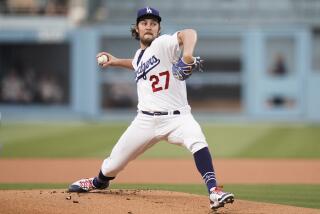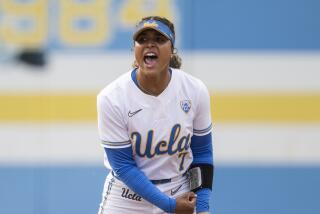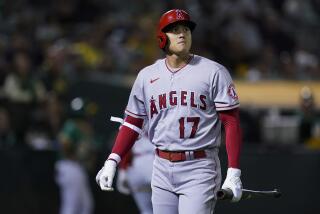Seattle’s Phil Bradley Is Giving Detractors a Lesson on Branding
- Share via
ARLINGTON, Tex. — He was a child who didn’t ask for much. He didn’t make demands. He kept to himself mostly, minding his own business.
But for some reason, Phil Bradley’s business always seemed to be everyone else’s. They all knew what he could and couldn’t do. They always branded him.
“I didn’t know if I could play this game or not,” said Bradley, the Seattle Mariners left fielder. “I just went out to see if I could.”
Someday people will learn. Phillip Poole Bradley, the son of Macomb, Ill., schoolteachers, burns them bad every time.
It all began in college, at the University of Missouri in 1977. He was branded as the school’s first black quarterback. Only about 14 weeks out of high school, and with little knowledge of the plays, an injury forced Bradley into the season opener against Southern California. The Tigers lost. Bradley’s detractors rallied, branding him with red-hot pokers.
They said he couldn’t throw. They said he would never be able to read defenses. They said move him to defensive back.
Yet to this day, eight years later, Bradley still holds 13 Missouri school records. And his 6,459 yards of career total offense still is the best in the Big Eight Conference.
His detractors didn’t learn.
They branded him negatively as a baseball player, too. No matter that he hit .457 his senior year at Missouri. No matter the Mariners made him a third-round pick.
“They do brand you, they just brand you in this game,” says Deron Johnson, Seattle hitting coach. “That’s the way it is.”
A scout at an NCAA regional said Bradley didn’t have a major league arm. Another said he didn’t have the speed. Another said he didn’t have the power, that he would never hit major league pitching. They said he would never pull the ball.
Yet, five years later, he is the starting left fielder for the Seattle Mariners. He is the American League’s third-leading hitter at .328. He has 83 hits and a .535 slugging percentage. And get this, after hitting only three home runs in four years of pro ball--none in the big leagues--he has hit 10 in 65 games this year.
Take that.
But that is not the way of 26-year-old Phil Bradley. He says things like “You don’t ever want to reach your potential,” and “When you’re young in this game, you’ve got to play,” and “I’m content, but not to the point of complete happiness yet.”
So he continues to mind his own buisness, long ago having divorced himself of others’ opinions.
“I don’t try to prove nobody wrong,” he said. “I’m more concerned with proving to myself I could do it.”
There are some people who believe Bradley could have been successful at whatever he did. One of those is Cowboys vice president Gil Brandt.
“He’s one of those guys, if he went to work at IBM, someday he’d run the company,” Brandt said.
That’s why, even though Bradley was not selected in the 1981 NFL draft--he had made his baseball intentions known--the Cowboys tried to sign him to a free agent contract. “Where if baseball didn’t work out, we’d have the rights to him,” Brandt said. “We thought he could be an outstanding free safety or wide receiver.”
But then that’s the very reason Bradley balked at football. He wanted to play quarterback, but there wasn’t much room for a 6-foot, 170-pound scrambling quarterbacks until Doug Flutie turned some heads.
So it was baseball, with football always an option. “And when I got my degree,” he says, “that was a third option.”
In Bradley’s grand plan of life, he gave himself until age 25 to become a major leaguer. If not, “maybe football or I’d try to get a job with my degree,” said Bradley, who had been contacted as late as 1983 by New Jersey of the USFL.
He never had to implement his occupational insurance policies. At age 24, the Mariners brought him to the majors for good. In 124 games, he hit .301, the only rookie last year to hit .300 in the American League and the first Mariners rookie to hit .300.
Yet, Bradley was still a singles hitter, a guy who hit no home runs in 322 official at bats and still wasn’t pulling the ball.
With two weeks left in spring training, Johnson and Bradley decided to shed another tag, and “get some authority into my hitting.” His stance was altered a bit. He dropped his hands. He got his legs into the swing.
“But I didn’t even know I’d be starting until the first game of the season,” Bradley said.
What a decision it was. The third game of the season, Bradley hit his first major league home run. The fifth game of the season, with two out in the ninth and the Mariners trailing, Bradley hit a game-winning grand slam home run off Minnesota’s Ron Davis.
He hasn’t slowed since. His average topped off June 8 at a league-leading .340. His lowest has been .286 on May 2. He has been in a slump lately, but must be considered as a serious All-Star Game write-in candidate.
In fact, in Columbia, Mo., where he resides during the offseason, a local radio station has begun a write-in Phil Bradley campaign.
“I don’t feel anymore I have to take a backseat to any of the pitchers,” Bradley said. “I respect them all, but they just might have to give me some credit now, too.”
That’s all the credit he allows himself, pointing out hitting .300 means making outs seven of 10 times up. “If I was hitting .600 . . . “
For credit, go to Johnson, the one who believed Bradley could hit “with authority.”
“He did it,” Johnson said. “He worked real hard, really studied and has gotten some results. He changed his image and he deserves it. I don’t know what the hell he can’t do.
“Like I said, they always brand you in this game. Well I brand him as just a good ballplayer.”
Well, after all these years, imagine that.
More to Read
Go beyond the scoreboard
Get the latest on L.A.'s teams in the daily Sports Report newsletter.
You may occasionally receive promotional content from the Los Angeles Times.










